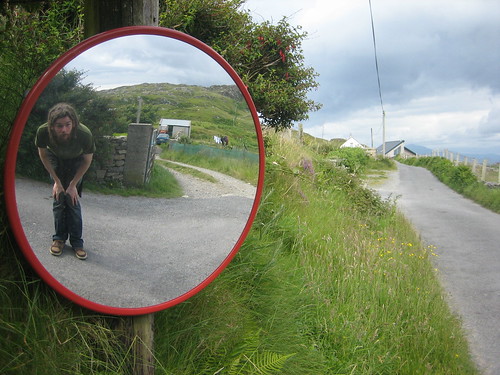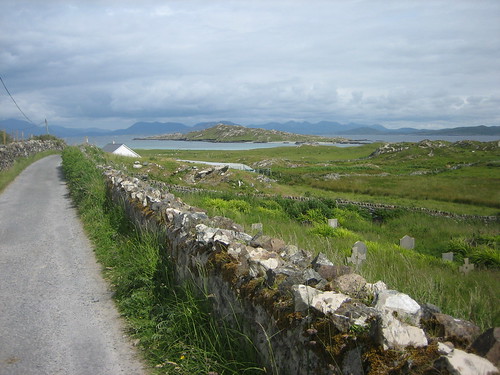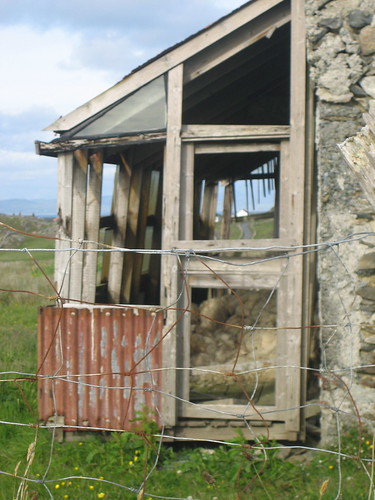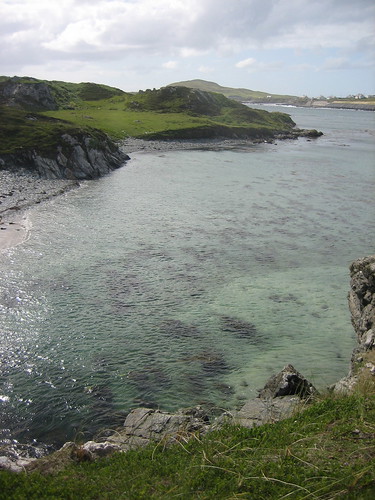Thanks to the Moon Handbooks marketing gurus, there's now an Amazon.com "storefront" with photo essays from lots of Moon authors, including yours truly.
This feature "went live" a month and a half ago, but after the initial rush of excitement I completely forgot to blog about it. Most of the photos were already on the gallery page of my website, but it's still pretty cool to see them on Amazon!
Saturday, June 28, 2008
Wednesday, June 25, 2008
Mary Modern now out in paperback!
 I almost wet myself with excitement the day my editor emailed me the new paperback cover. Isn't it incredible? The über-talented Dan Rembert designed both covers, but he really outdid himself with the re-design. You can't see it too well in the jpeg, but those faint horizontal lines are DNA code. Captures the quirky spirit of the book just perfectly.
I almost wet myself with excitement the day my editor emailed me the new paperback cover. Isn't it incredible? The über-talented Dan Rembert designed both covers, but he really outdid himself with the re-design. You can't see it too well in the jpeg, but those faint horizontal lines are DNA code. Captures the quirky spirit of the book just perfectly.At the back of the book you'll find a reading group guide as well as an author essay written especially for the paperback edition. I wrote about how this photo of my great-grandparents sparked the idea.
Hard to believe it's been a year since the novel came out. I'm trying not to think about how well the paperback will end up selling, and actually, it isn't all that hard when my head is so full of plot lines and bits of dialogue from Petty Magic...
Wednesday, June 18, 2008
Inishbofin
Brendan and I just got back from two nights on Inishbofin, a small (6km long by 3.5km wide) island a half-hour ferry ride off the coast of Connemara (not far from Clifden).

There isn't really anything in the way of tourist attractions, so Inishbofin doesn't see as many visitors as, say, Inis Mór (the largest Aran island). We came hoping for long peaceful walks and a bit of swimming, and we got both.

Above: the main road out to "East End Village," with a view of little Inis Laighean (uninhabited except by birds and occasionally sheep, which are brought over by boat) and the Twelve Bens of Connemara in the distance.
 On our Monday evening walk to the northern shore, we passed this shed full of fleeces. There are plenty of sheep on the island, many of which had been sheared recently.
On our Monday evening walk to the northern shore, we passed this shed full of fleeces. There are plenty of sheep on the island, many of which had been sheared recently.

Inis Laighean again, with a view over the island's graveyard and the ruins of St. Colman's Abbey.

A closer view of Inis Laighean. On Tuesday morning we swam out to it, over a lot of long hair-like seaweed that got tangled around our limbs until we started swimming on our backs. It was a little creepy, that sensation of slender slippery vines winding around my neck and arms. The water was only waist-deep at most though. We got to the far shore and frolicked over much of the island. I never thought I would be walking barefoot on sheep turds in a wet bathing suit and telling you it was one of the most glorious things I've ever done, but here you have it. It was so exhilarating. The weather changed every few minutes--sometimes it was warm and sunny and then the clouds would gather and it would drizzle a bit. The island itself was interesting too--hilly and rocky and covered in strange squishy mosses and heather and tiny wildflowers.
Later that day, when we had lunch at this great little café nearby (called The Galley), we told the owner we'd swum out to it and she seemed pretty horrified. She told us we were crazy. We had just assumed loads of people swam out to it, but she said she hadn't ever heard of anyone swimming it, only walking out at low tide (when there was no water at all) and then getting stranded on the far side. She showed us how to get to the ruins of Cromwell's barracks, on an island overlooking the harbor, but when we got to the place where we were meant to take off our shoes and socks and wade across, the water was too deep (we weren't wearing our bathing suits anymore, otherwise we'd have done it). Here's a view of Port Island, where the barracks are--see those three little mounds on the horizon line?

Anyway, if you ever go to Inishbofin, swim out to Inis Laighean and romp around a bit. The views are amazing, and if you don't like the idea of tramping on sheep poo in your bare feet you can always pack a pair of water shoes.


There isn't really anything in the way of tourist attractions, so Inishbofin doesn't see as many visitors as, say, Inis Mór (the largest Aran island). We came hoping for long peaceful walks and a bit of swimming, and we got both.

Above: the main road out to "East End Village," with a view of little Inis Laighean (uninhabited except by birds and occasionally sheep, which are brought over by boat) and the Twelve Bens of Connemara in the distance.
 On our Monday evening walk to the northern shore, we passed this shed full of fleeces. There are plenty of sheep on the island, many of which had been sheared recently.
On our Monday evening walk to the northern shore, we passed this shed full of fleeces. There are plenty of sheep on the island, many of which had been sheared recently.
Inis Laighean again, with a view over the island's graveyard and the ruins of St. Colman's Abbey.

A closer view of Inis Laighean. On Tuesday morning we swam out to it, over a lot of long hair-like seaweed that got tangled around our limbs until we started swimming on our backs. It was a little creepy, that sensation of slender slippery vines winding around my neck and arms. The water was only waist-deep at most though. We got to the far shore and frolicked over much of the island. I never thought I would be walking barefoot on sheep turds in a wet bathing suit and telling you it was one of the most glorious things I've ever done, but here you have it. It was so exhilarating. The weather changed every few minutes--sometimes it was warm and sunny and then the clouds would gather and it would drizzle a bit. The island itself was interesting too--hilly and rocky and covered in strange squishy mosses and heather and tiny wildflowers.
Later that day, when we had lunch at this great little café nearby (called The Galley), we told the owner we'd swum out to it and she seemed pretty horrified. She told us we were crazy. We had just assumed loads of people swam out to it, but she said she hadn't ever heard of anyone swimming it, only walking out at low tide (when there was no water at all) and then getting stranded on the far side. She showed us how to get to the ruins of Cromwell's barracks, on an island overlooking the harbor, but when we got to the place where we were meant to take off our shoes and socks and wade across, the water was too deep (we weren't wearing our bathing suits anymore, otherwise we'd have done it). Here's a view of Port Island, where the barracks are--see those three little mounds on the horizon line?

Anyway, if you ever go to Inishbofin, swim out to Inis Laighean and romp around a bit. The views are amazing, and if you don't like the idea of tramping on sheep poo in your bare feet you can always pack a pair of water shoes.

Sunday, June 15, 2008
Thoughts on Criticism and Rejection
Rejection is hard. It gets a little easier as you go on, but not by much. The sooner you start to devise little coping strategies to keep your ego patched, the better off you'll be.
Whenever I got to feeling down over a rejection (or, later on, a snarky Amazon review), I thought: Well, the person who is criticizing me [an editor, reviewer, or random reader] can’t do what I’m doing--they don’t have the guts, or the talent, or either of the two. This may sound snarky in its own right, and maybe it is. It also isn’t fair to all those wonderfully talented editors and agents out there, those midwives and shepherds of the literary world. Then again, I’ve found that the most talented editors and agents in the business do not write rejection letters that leave you feeling like a sack of elephant crap. Those are the letters--tactful, and sometimes even very encouraging--that spur you on.
This attitude I’m talking about--THEY can’t do it and therefore I should take their criticism with a grain of salt--is merely a coping strategy. I'm not talking about the criticism that you know in your heart is wise and right on the money. This is just something to keep in mind when you start feeling like you’ve seriously overestimated your own talent. Even if you’ve written the sloppiest, most derivative novel ever put to paper, a manuscript that will never see publication, you’ve still accomplished more than most folks ever do.
I'm not discounting the job of reviewers. Literary criticism is as necessary as literature itself, and can be every bit as enjoyable to read. It just drives me nuts when I read a snarky review. It's like when a reviewer takes pains to include some line about Mary Modern not holding a candle to the original Frankenstein. First of all, it's NOT Frankenstein, nor is it a retelling. Nobody was claiming on the dust jacket or marketing materials that I wrote an instant classic. It comes off sounding like a jab, and it's completely unnecessary. In another case, a reviewer dismissed my characters as ciphers--never mind that I can tell you every character in that book is based on a person (or, more often, a series of people) I've known in real life. As I read that particular review, it was abundantly clear that the reviewer had decided not to like my book before he even cracked the spine.
You definitely start to sense a bit of envy between the lines of these reviews sometimes. Perhaps the reviewer is himself a frustrated fiction writer, so he says your work is derivative, mediocre, or what have you. Mind you, I'm not whining or being underhandedly smug here--I'm saying this because I often felt this impulse myself before I was published. I have taken notice of several literary catfights in recent years, most memorably between Laura Miller of Salon.com and the novelist Chuck Palahniuk. She wrote a review of Diary in 2003 that was so unbelievably negative it was downright undignified, and he responded with a letter to the editor that had me jumping with glee:
(By the way, I haven't read any of Mr. Palahniuk's novels, but I don't care if Diary was the worst piece of tripe published in this or any other century; nothing could justify the writing of probably the nastiest, snarkiest piece of "journalism" I have ever read. Even this Salon critic's less controversial columns have really annoyed me from time to time--like when she dismissed David Mitchell's Cloud Atlas--which is an utterly sublime novel--as an albeit-fun pastiche. She's sounding more and more like a frustrated novelist, eh?)
Anyway, the upshot of all this is that one must read a book review with a critical eye. Sometimes reviewers are needlessly harsh for reasons that have more to do with them than the author, and sometimes there are good reviews of mediocre books written by acolytes. Sometimes there are reviews of books by great writers that are criticized by novelists whose work is patently inferior, or a novelist who is insecure about her own place in the literary canon and acts on an urge to cut down a fellow author. And sometimes, once in a blue moon it seems, there's a thoughtful review written by someone with no angle at all.
But that's not the real reason I've stopped reading book reviews. The real reason is that avoiding them is another coping strategy for me--otherwise I'd be reading glowing reviews of books with rehashed plots thinking, Damn it, why did this newspaper ignore my book? Also, I stopped reading the Amazon/Librarything/whatever reviews not too long after Mary Modern was published. There are some really ridiculous ones out there--there's at least one two-star review that spells my name "Deangeiiis," and says my book was poorly edited without even bothering to make a logical case for the assertion. WHO takes these people seriously? Who? Not me, that's who--those crappy, illogical, useless reviews can only raise my blood pressure.
Whenever I got to feeling down over a rejection (or, later on, a snarky Amazon review), I thought: Well, the person who is criticizing me [an editor, reviewer, or random reader] can’t do what I’m doing--they don’t have the guts, or the talent, or either of the two. This may sound snarky in its own right, and maybe it is. It also isn’t fair to all those wonderfully talented editors and agents out there, those midwives and shepherds of the literary world. Then again, I’ve found that the most talented editors and agents in the business do not write rejection letters that leave you feeling like a sack of elephant crap. Those are the letters--tactful, and sometimes even very encouraging--that spur you on.
This attitude I’m talking about--THEY can’t do it and therefore I should take their criticism with a grain of salt--is merely a coping strategy. I'm not talking about the criticism that you know in your heart is wise and right on the money. This is just something to keep in mind when you start feeling like you’ve seriously overestimated your own talent. Even if you’ve written the sloppiest, most derivative novel ever put to paper, a manuscript that will never see publication, you’ve still accomplished more than most folks ever do.
I'm not discounting the job of reviewers. Literary criticism is as necessary as literature itself, and can be every bit as enjoyable to read. It just drives me nuts when I read a snarky review. It's like when a reviewer takes pains to include some line about Mary Modern not holding a candle to the original Frankenstein. First of all, it's NOT Frankenstein, nor is it a retelling. Nobody was claiming on the dust jacket or marketing materials that I wrote an instant classic. It comes off sounding like a jab, and it's completely unnecessary. In another case, a reviewer dismissed my characters as ciphers--never mind that I can tell you every character in that book is based on a person (or, more often, a series of people) I've known in real life. As I read that particular review, it was abundantly clear that the reviewer had decided not to like my book before he even cracked the spine.
You definitely start to sense a bit of envy between the lines of these reviews sometimes. Perhaps the reviewer is himself a frustrated fiction writer, so he says your work is derivative, mediocre, or what have you. Mind you, I'm not whining or being underhandedly smug here--I'm saying this because I often felt this impulse myself before I was published. I have taken notice of several literary catfights in recent years, most memorably between Laura Miller of Salon.com and the novelist Chuck Palahniuk. She wrote a review of Diary in 2003 that was so unbelievably negative it was downright undignified, and he responded with a letter to the editor that had me jumping with glee:
I have never responded to a review, perhaps because I've never gotten such a cruel and mean-spirited one.Please send me a copy of your latest book. I'd love to read it.
Until you can create something that captivates people, I'd invite you to just shut up. It's easy to attack and destroy an act of creation. It's a lot more difficult to perform one. I'd also invite you to read the reviews Fitzgerald got for "Gatsby" from dull, sad, bitter people -- like yourself.
Amen, Chuck.
(By the way, I haven't read any of Mr. Palahniuk's novels, but I don't care if Diary was the worst piece of tripe published in this or any other century; nothing could justify the writing of probably the nastiest, snarkiest piece of "journalism" I have ever read. Even this Salon critic's less controversial columns have really annoyed me from time to time--like when she dismissed David Mitchell's Cloud Atlas--which is an utterly sublime novel--as an albeit-fun pastiche. She's sounding more and more like a frustrated novelist, eh?)
Anyway, the upshot of all this is that one must read a book review with a critical eye. Sometimes reviewers are needlessly harsh for reasons that have more to do with them than the author, and sometimes there are good reviews of mediocre books written by acolytes. Sometimes there are reviews of books by great writers that are criticized by novelists whose work is patently inferior, or a novelist who is insecure about her own place in the literary canon and acts on an urge to cut down a fellow author. And sometimes, once in a blue moon it seems, there's a thoughtful review written by someone with no angle at all.
But that's not the real reason I've stopped reading book reviews. The real reason is that avoiding them is another coping strategy for me--otherwise I'd be reading glowing reviews of books with rehashed plots thinking, Damn it, why did this newspaper ignore my book? Also, I stopped reading the Amazon/Librarything/whatever reviews not too long after Mary Modern was published. There are some really ridiculous ones out there--there's at least one two-star review that spells my name "Deangeiiis," and says my book was poorly edited without even bothering to make a logical case for the assertion. WHO takes these people seriously? Who? Not me, that's who--those crappy, illogical, useless reviews can only raise my blood pressure.
Sunday, June 8, 2008
More stuff to spook you
While I was writing Mary Modern I often took breaks in the middle of the night to read the supposedly true ghost stories at Castle of Spirits. This scary-story habit definitely flavored my fiction. I thought I'd post links to a couple of my very favorite stories, Happy Birthday, Mr. Poe, A Voice in the Attic, and A Song for Clara. "A Voice in the Attic" freaked the crap out of me, so consider yourself warned.
Another story that made a profound impression on me is Le Fanu's Strange Event in the Life of Schalken the Painter (you can also listen to it at Librivox, but unfortunately the sound quality is poor). Schalken was a real-life artist in the 17th century, whose eerie portraits of girls in candlelight inspired this tale of a poor young artist's apprentice struggling to free his beloved from the greedy grip of a very rich, very frightening old man.
There are other good stories in the Librivox Ghost Story Collection #1 (click same link above), particularly E. Nesbit's Man-Size in Marble and Uncle Abraham's Romance. Edith Nesbit is best known for her children's fiction--thanks to Ailbhe for giving me a copy of The Enchanted Castle!--but I'm finding her ghost stories even more enjoyable. I've got to pick up a copy of The Power of Darkness, a new collection of the same stories originally published as Grim Tales in 1893.
One last note: before you wonder if any of this is appropriate bedtime reading, I'd just like to mention that I finally read Flannery O'Connor's A Good Man is Hard to Find the other night. I can see why she's considered one of the 20th-century masters of the short story, but damn, was it ever disturbing. I had to read a few more ghost stories on Castle of Spirits just to try to clear my head.
Another story that made a profound impression on me is Le Fanu's Strange Event in the Life of Schalken the Painter (you can also listen to it at Librivox, but unfortunately the sound quality is poor). Schalken was a real-life artist in the 17th century, whose eerie portraits of girls in candlelight inspired this tale of a poor young artist's apprentice struggling to free his beloved from the greedy grip of a very rich, very frightening old man.
There are other good stories in the Librivox Ghost Story Collection #1 (click same link above), particularly E. Nesbit's Man-Size in Marble and Uncle Abraham's Romance. Edith Nesbit is best known for her children's fiction--thanks to Ailbhe for giving me a copy of The Enchanted Castle!--but I'm finding her ghost stories even more enjoyable. I've got to pick up a copy of The Power of Darkness, a new collection of the same stories originally published as Grim Tales in 1893.
One last note: before you wonder if any of this is appropriate bedtime reading, I'd just like to mention that I finally read Flannery O'Connor's A Good Man is Hard to Find the other night. I can see why she's considered one of the 20th-century masters of the short story, but damn, was it ever disturbing. I had to read a few more ghost stories on Castle of Spirits just to try to clear my head.
Friday, June 6, 2008
Cúirt, finally
Cúirt (roughly pronounced "corch") is Galway's international literary festival. It's a really exciting time to be here. Sometimes there are famous authors you can't wait to see and sometimes you discover the work of a new writer, and even if you don't attend a single reading there's still lots of craic to be had at the pub afterwards. It is very much a literary festival though--hugely 'prestigious' to the point where the festival committee won't ask any writer who's garnered 'too much' commercial success. Some folks are pretentious (more the hobnobbers than the writers themselves), but the rest of us feel free to make fun of them.
This year the speaker I was most excited about was Samantha Power, Pulitzer Prize-winning journalist and former foreign policy adviser to Barack Obama. I couldn't believe tickets for this event were only €6! And let me tell you, she is AMAZING. Not only is she incredibly smart and articulate--you'd expect that from a Pulitzer winner, right?--but she is also unbelievably humble. Everything she said impressed me. She read a short excerpt from her new book, Chasing the Flame, but she spent most of the hour beforehand giving us clear and thorough background information without aid of a single notecard.
There was a Q&A afterwards and naturally people asked plenty of asinine questions, all of which she answered with grace and humor. One guy asked, "If Obama is elected, how long do you think it will be before there's an attempt made on his life?" There was a general hmmph of disdain from the rest of the theater as Ms. Power answered (paraphrasing here), "The concise answer to that is, I don't know."
As for the Pulitzer, she very candidly told one audience member that she believes the reason she won is that the judges probably felt like they were "doing something" positive just by giving the award and thus raising people's awareness that genocide is still happening. A Problem from Hell was rejected by something like twenty-two publishers.
I have a copy of A Problem from Hell, but I probably wouldn't have asked her to sign it even if I had brought it with me. Whenever I meet an author, even if it's an author I haven't read yet (and thus, haven't had the chance to become speechless with awe over), I always manage to say something stupid. (This goes for musicians, too, which is part of why I didn't stick around after the Elbow show even though I'd brought one of their CDs with me.) I've gotten to the point where I'd rather just avoid any opportunity to put my foot in my mouth.
Galway is a great city for festivals in general--the Arts festival program is being launched tonight. Loads of plays, concerts, and art the last two weeks of July!
This year the speaker I was most excited about was Samantha Power, Pulitzer Prize-winning journalist and former foreign policy adviser to Barack Obama. I couldn't believe tickets for this event were only €6! And let me tell you, she is AMAZING. Not only is she incredibly smart and articulate--you'd expect that from a Pulitzer winner, right?--but she is also unbelievably humble. Everything she said impressed me. She read a short excerpt from her new book, Chasing the Flame, but she spent most of the hour beforehand giving us clear and thorough background information without aid of a single notecard.
There was a Q&A afterwards and naturally people asked plenty of asinine questions, all of which she answered with grace and humor. One guy asked, "If Obama is elected, how long do you think it will be before there's an attempt made on his life?" There was a general hmmph of disdain from the rest of the theater as Ms. Power answered (paraphrasing here), "The concise answer to that is, I don't know."
As for the Pulitzer, she very candidly told one audience member that she believes the reason she won is that the judges probably felt like they were "doing something" positive just by giving the award and thus raising people's awareness that genocide is still happening. A Problem from Hell was rejected by something like twenty-two publishers.
I have a copy of A Problem from Hell, but I probably wouldn't have asked her to sign it even if I had brought it with me. Whenever I meet an author, even if it's an author I haven't read yet (and thus, haven't had the chance to become speechless with awe over), I always manage to say something stupid. (This goes for musicians, too, which is part of why I didn't stick around after the Elbow show even though I'd brought one of their CDs with me.) I've gotten to the point where I'd rather just avoid any opportunity to put my foot in my mouth.
Galway is a great city for festivals in general--the Arts festival program is being launched tonight. Loads of plays, concerts, and art the last two weeks of July!
Wednesday, June 4, 2008
Another audio treat: The Canterville Ghost by Oscar Wilde
I remember seeing a TV movie version of "The Canterville Ghost" starring George C. Scott in the '80s, but it's taken me this long to read Wilde's original short story, a delightful gothic satire. Sir Simon de Canterville murdered his wife in 1575, and since his own mysterious demise he has taken great relish in terrorizing his descendants at Canterville Chase. Finally fed up, the last lord of Canterville sells the estate to a pragmatic American minister and his family, none of whom are the least bit frightened by the ghost's theatrics.
With the enthusiastic egotism of the true artist, he went over his most celebrated performances, and smiled bitterly to himself as he recalled to mind his last appearance as "Red Reuben, or the Strangled Babe," his début as "Guant Gibeon, the Blood-sucker of Bexley Moor," and the furore he had excited one lovely June evening by merely playing ninepins with his own bones upon the lawn-tennis ground...Listen on Librivox or read it at Project Gutenberg.
Subscribe to:
Comments (Atom)
